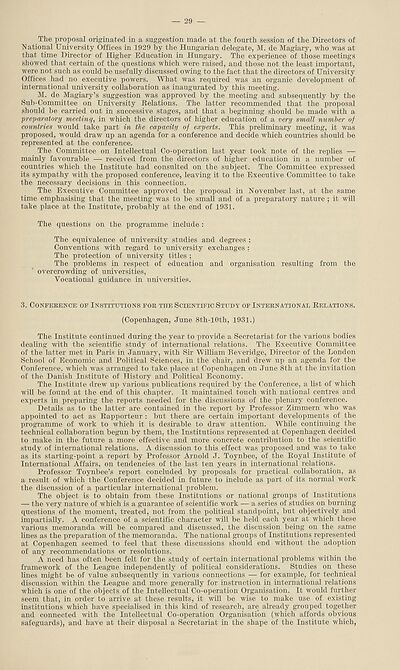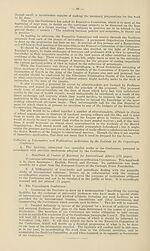International > Report by the committee on the work of its ... plenary session > Thirteenth plenary session
(29)
Download files
Complete book:
Individual page:
Thumbnail gallery: Grid view | List view

— 29
The proposal originated in a suggestion made at the fourth session of the Directors of
National University Offices in 1929 by the Hungarian delegate, M. de Magiary, who was at
that time Director of Higher Education in Hungary. The experience of those meetings
showed that certain of the questions which were raised, and those not the least important,
were not such as could be usefully discussed owing to the fact that the directors of University
Offices had no executive powers. What was required was an organic development of
international university collaboration as inaugurated by this meeting.
M. de Magiary’s suggestion was approved by the meeting and subsequently by the
Sub-Committee on University Relations. The latter recommended that the proposal
should be carried out in successive stages, and that a beginning should be made with a
'preparatory meetiny, in which the directors of higher education of a very small number of
countries would take part in the capacity of experts. This preliminary meeting, it was
proposed, would draw up an agenda for a conference and decide which countries should be
represented at the conference.
The Committee on Intellectual Co-operation last year took note of the replies —
mainly favourable — received from the directors of higher education in a number of
countries which the Institute had consulted on the subject. The Committee expressed
its sympathy with the proposed conference, leaving it to the Executive Committee to take
the necessary decisions in this connection.
The Executive Committee approved the proposal in November last, at the same
time emphasising that the meeting was to be small and of a preparatory nature ; it will
take place at the Institute, probably at the end of 1931.
The questions on the programme include :
The equivalence of university studies and degrees ;
Conventions with regard to university exchanges :
The protection of university titles ;
The problems in respect of education and organisation resulting from the
overcrowding of universities,
Vocational guidance in universities.
3. Conference of Institutions for the Scientific Study of International Relations.
(Copenhagen, June 8th-10th, 1931.)
The Institute continued during the year to provide a Secretariat for the various bodies
dealing with the scientific study of international relations. The Executive Committee
of the latter met in Paris in January, with Sir William Beveridge, Director of the London
School of Economic and Political Sciences, in the chair, and drew up an agenda for the
Conference, which was arranged to take place at Copenhagen on June 8th at the invitation
of the Danish Institute of History and Political Economy.
The Institute drew up various publications required by the Conference, a list of which
will be found at the end of this chapter. It maintained touch with national centres and
experts in preparing the reports needed for the discussions of the plenary conference.
Details as to the latter are contained in the report by Professor Zimmern who was
appointed to act as Rapporteur : but there are certain important developments of the
programme of work to which it is desirable to draw attention. While continuing the
technical collaboration begun by them, the Institutions represented at Copenhagen decided
to make in the future a more effective and more concrete contribution to the scientific
study of international relations. A discussion to this effect was proposed and was to take
as its starting-point a report by Professor Arnold J. Toynbee, of the Royal Institute of
International Affairs, on tendencies of the last ten years in international relations.
Professor Toynbee’s report concluded by proposals for practical collaboration, as
a result of which the Conference decided in future to include as part of its normal work
the discussion of a particular international problem.
The object is to obtain from these Institutions or national groups of Institutions
— the very nature of which is a guarantee of scientific work — a series of studies on burning
questions of the moment, treated, not from the political standpoint, but objectively and
impartially. A conference of a scientific character will be held each year at which these
various memoranda will be compared and discussed, the discussion being on the same
lines as the preparation of the memoranda. The national groups of Institutions represented
at Copenhagen seemed to feel that these discussions should end without the adoption
of any recommendations or resolutions.
A need has often been felt for the study of certain international problems within the
framework of the League independently of political considerations. Studies on these
lines might be of value subsequently in various connections — for example, for technical
discussion within the League and more generally for instruction in international relations
which is one of the objects of the Intellectual Co-operation Organisation. It would further
seem that, in order to arrive at these results, it will be wise to make use of existing
institutions which have specialised in this kind of research, are already grouped together
and connected with the Intellectual Co-operation Organisation (which affords obvious
safeguards), and have at their disposal a Secretariat in the shape of the Institute which,
The proposal originated in a suggestion made at the fourth session of the Directors of
National University Offices in 1929 by the Hungarian delegate, M. de Magiary, who was at
that time Director of Higher Education in Hungary. The experience of those meetings
showed that certain of the questions which were raised, and those not the least important,
were not such as could be usefully discussed owing to the fact that the directors of University
Offices had no executive powers. What was required was an organic development of
international university collaboration as inaugurated by this meeting.
M. de Magiary’s suggestion was approved by the meeting and subsequently by the
Sub-Committee on University Relations. The latter recommended that the proposal
should be carried out in successive stages, and that a beginning should be made with a
'preparatory meetiny, in which the directors of higher education of a very small number of
countries would take part in the capacity of experts. This preliminary meeting, it was
proposed, would draw up an agenda for a conference and decide which countries should be
represented at the conference.
The Committee on Intellectual Co-operation last year took note of the replies —
mainly favourable — received from the directors of higher education in a number of
countries which the Institute had consulted on the subject. The Committee expressed
its sympathy with the proposed conference, leaving it to the Executive Committee to take
the necessary decisions in this connection.
The Executive Committee approved the proposal in November last, at the same
time emphasising that the meeting was to be small and of a preparatory nature ; it will
take place at the Institute, probably at the end of 1931.
The questions on the programme include :
The equivalence of university studies and degrees ;
Conventions with regard to university exchanges :
The protection of university titles ;
The problems in respect of education and organisation resulting from the
overcrowding of universities,
Vocational guidance in universities.
3. Conference of Institutions for the Scientific Study of International Relations.
(Copenhagen, June 8th-10th, 1931.)
The Institute continued during the year to provide a Secretariat for the various bodies
dealing with the scientific study of international relations. The Executive Committee
of the latter met in Paris in January, with Sir William Beveridge, Director of the London
School of Economic and Political Sciences, in the chair, and drew up an agenda for the
Conference, which was arranged to take place at Copenhagen on June 8th at the invitation
of the Danish Institute of History and Political Economy.
The Institute drew up various publications required by the Conference, a list of which
will be found at the end of this chapter. It maintained touch with national centres and
experts in preparing the reports needed for the discussions of the plenary conference.
Details as to the latter are contained in the report by Professor Zimmern who was
appointed to act as Rapporteur : but there are certain important developments of the
programme of work to which it is desirable to draw attention. While continuing the
technical collaboration begun by them, the Institutions represented at Copenhagen decided
to make in the future a more effective and more concrete contribution to the scientific
study of international relations. A discussion to this effect was proposed and was to take
as its starting-point a report by Professor Arnold J. Toynbee, of the Royal Institute of
International Affairs, on tendencies of the last ten years in international relations.
Professor Toynbee’s report concluded by proposals for practical collaboration, as
a result of which the Conference decided in future to include as part of its normal work
the discussion of a particular international problem.
The object is to obtain from these Institutions or national groups of Institutions
— the very nature of which is a guarantee of scientific work — a series of studies on burning
questions of the moment, treated, not from the political standpoint, but objectively and
impartially. A conference of a scientific character will be held each year at which these
various memoranda will be compared and discussed, the discussion being on the same
lines as the preparation of the memoranda. The national groups of Institutions represented
at Copenhagen seemed to feel that these discussions should end without the adoption
of any recommendations or resolutions.
A need has often been felt for the study of certain international problems within the
framework of the League independently of political considerations. Studies on these
lines might be of value subsequently in various connections — for example, for technical
discussion within the League and more generally for instruction in international relations
which is one of the objects of the Intellectual Co-operation Organisation. It would further
seem that, in order to arrive at these results, it will be wise to make use of existing
institutions which have specialised in this kind of research, are already grouped together
and connected with the Intellectual Co-operation Organisation (which affords obvious
safeguards), and have at their disposal a Secretariat in the shape of the Institute which,
Set display mode to:
![]() Universal Viewer |
Universal Viewer | ![]() Mirador |
Large image | Transcription
Mirador |
Large image | Transcription
Images and transcriptions on this page, including medium image downloads, may be used under the Creative Commons Attribution 4.0 International Licence unless otherwise stated. ![]()
| League of Nations > International > Report by the committee on the work of its ... plenary session > Thirteenth plenary session > (29) |
|---|
| Permanent URL | https://digital.nls.uk/195316757 |
|---|
| Attribution and copyright: |
|
|---|---|
| Shelfmark | LN.XII.5 |
|---|---|
| Shelfmark | LN.XII |
|---|
| Description | Over 1,200 documents from the non-political organs of the League of Nations that dealt with health, disarmament, economic and financial matters for the duration of the League (1919-1945). Also online are statistical bulletins, essential facts, and an overview of the League by the first Secretary General, Sir Eric Drummond. These items are part of the Official Publications collection at the National Library of Scotland. |
|---|---|
| Additional NLS resources: |
|

